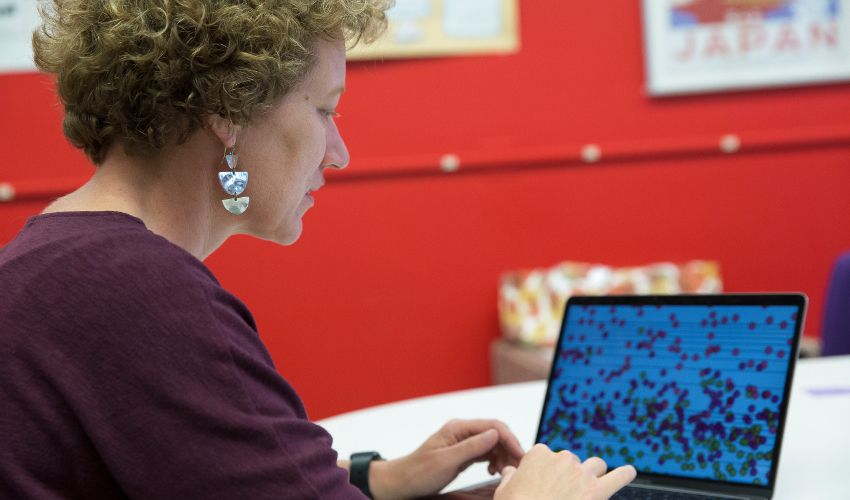Faculty, staff apply expertise to provide perspective and aid

Assistant Professor of Biology Pleuni Pennings, an expert in the genetics and evolution of HIV
Amid the COVID-19 pandemic, the SF State community is tackling xenophobia, dispelling misinformation and raising disability awareness
Since the beginning of the COVID-19 pandemic, San Francisco State University faculty and staff have offered up their expertise to help the public make sense of and cope with impacts of the virus, driving positive change in the process.
As the world works to limit the spread of COVID-19, San Francisco State Chair and Professor of Asian American Studies Russell Jeung has been focused on addressing a byproduct of the pandemic: an upswing in racism and xenophobia, primarily targeting Asians.
Jeung has been speaking out about the trend for months, calling attention to the problem through high-profile appearances on “Good Morning America,” National Public Radio and elsewhere. He has also addressed the trend at virtual events such as at a recent town hall with state Assemblymember Phil Ting.
To better track the problem, the Asian American Studies Department teamed up with the Asian Pacific Planning and Policy Council and Chinese for Affirmative Action to launch a website that allows people to report harassment and attacks.
Another side effect of the pandemic? Shoddy science, reports SF State Assistant Professor of Biology Pleuni Pennings. The rapid spread of SARS-CoV-2, the virus that causes COVID-19, sparked a flurry of new research and scientific punditry around the world.
It’s always possible for scientific studies to be later proven incorrect, and Pennings says that’s even more likely when the process of research speeds up to keep pace with a rapidly spreading virus. “I think that’s OK, if the whole [research process] shifts to be a little bit faster and riskier and more likely to be wrong,” she explained. “But sometimes there are cases where they’re way out there, and that should not have happened.”
That can make it difficult for the public to simply navigate the day’s news, she observed. For Pennings, who studies the genetics and evolution of HIV, setting the record straight is just part of the job. Recently, in an article in LiveScience, she debunked a study claiming that the novel coronavirus may have hopped to humans from dogs.
She also provided educational context early in the pandemic, when scientists saw evidence that the virus was spreading in the state of Washington. Their conclusion was based on some complex genetics, so Pennings sprang into action and made a video explaining the genetic evidence in easy-to-understand terms, later creating another explanatory video with two colleagues. She was then tapped for her expertise on the genetics and evolution of viruses in the New York Times and spoke with WIRED Magazine about how researchers can responsibly speak about the virus.
But for navigating many aspects of the pandemic, Pennings explains, she’s in the same position as the rest of us — from figuring out what activities are safe to guessing at how long prevention measures might last. “I try do the same thing as everybody else, but I think the more background you have, the faster you can parse the information — and also see when there is maybe some nonsense.”
Meanwhile, experts at SF State’s Paul K. Longmore Institute on Disability have leveraged the stay-at-home order to spread programming for and about disability culture to a broad audience. As experts in online accessibility, they quickly offered an array of online content, including an online-only version of their annual disability film festival Superfest. Not only is the shift a first for the organization, it also opens participation to an even wider audience. “We had someone post that this is the first film festival they’ve been able to attend, because festivals aren’t usually accessible,” said Longmore Institute Associate Director Emily Beitiks. Future screenings, she says, will include one for children.
The Longmore Institute has also aided other organizations as they attempt to move their disability-related content online. The institute partnered with Netflix to screen the company’s new award-winning documentary “Crip Camp,” a film about attendees at a camp for children with disabilities who later led the disability rights movement. They also held a number of online panels in conjunction with the screening. Other film festivals, like Seattle’s transgender film festival and the Jewish Film Festival, have approached the institute about how to move festivals online.
Given the dangers of COVID-19 to specific groups, Beitiks says, the institute’s outreach efforts are more important than ever. “There’s a lot at stake for people with disabilities, especially black and brown disabled people,” Beitiks said. “It’s a population with higher risks of fatalities from the coronavirus.”